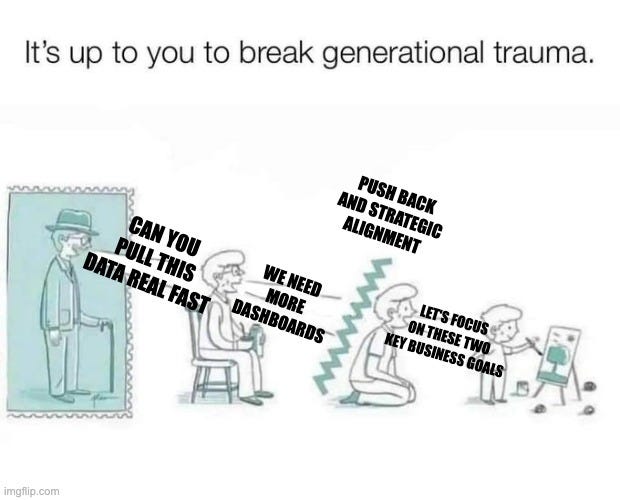How to Escape the Ad-Hoc Data Request Trap - 4 Mindset Shifts From a Former Director Of Analytics
Over the past few weeks, I’ve been running a series of webinars with experienced data leaders, folks with decades of hands-on experience.
One of those sessions was titled “From Reactive to Proactive: Managing Stakeholders to Unlock Strategic Data Work.”
It turned into a standout conversation with Celina Wong, who’s led data teams at companies like Ulta and Poppins and recently served as CEO of a data consulting firm. We dug into a problem that nearly every data team wrestles with.
Too often, data teams get stuck in reactive cycles, pulling data, building dashboards, and answering questions as they come. Over time, that leads to hundreds (or thousands) of assets that no one actually uses. Worse, a lot of them were never aligned to the business strategy in the first place.
So how do you break the cycle?
How do you shift your data team from reactive responders to strategic partners?
When You’re Reactive, You Don’t Actually Have Influence
Let’s start with the big question:
Why should your data team shift from reactive to proactive?
Is it even worth it for your company?
In most cases, yes, absolutely. Because staying reactive traps your team in a low-leverage, low-impact cycle.
Here’s what that looks like:
You’re always behind: By the time you ship the dashboard or answer the question, the conversation has already moved on.
You can’t prioritize: Everything feels urgent when you're not aligned to broader goals. There's no clear filter for what's worth doing.
You’re seen as just an input output machine: Stakeholders bring you pre-baked solutions because they see you as a tool. Just a input output machine.
You have zero influence: Yes, your team might be seen as helpful, but not essential. If the business could self-serve straight from the warehouse, they would. In their eyes, you’re just middleware between them and the answers they need for their strategic initiatives.
So, how do you break out of that trap and become more proactive?
Care About the Business, Not Just the Stakeholder
Keep reading with a 7-day free trial
Subscribe to SeattleDataGuy’s Newsletter to keep reading this post and get 7 days of free access to the full post archives.

